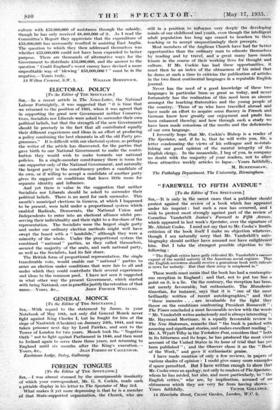ELECTORAL POLICY
. [To the Editor of THE SPECTATOR.] a recent article in The News-Letter, the National Labour Fortnightly, it was suggested that " it is time that we returned to the position of 1931, when it was agreed that in supporting the great new Government neither Conserva- tives, Socialists nor Liberals were asked tosurrender their own political beliefs, but that the strength of the new Government should lie precisely in the fact that all contributed equally their different experiences and ideas in an effort at producing a policy combining the best elements in all the old Party pro- grammes." It is difficult with our electoral system, as perhaps the writer of the article has discovered, for the parties that gave birth to our National Government to make the contri- bution they would wish to make towards our national policies. In a single-member constituency there is room for one supporter only of the National Government, and naturally the largest party in'the constituency prefers a candidate of its own, or if willing to accept a candidate of another party - gives its support on conditions that leave little room for separate identity and influence.
And yet there is value in the suggestion that neither Socialists nor Liberals should be asked to surrender their political beliefs. There is no need for such surrender. This month's municipal elections in Geneva, at which I happened. to be present, were held under a proportional system which enabled Radicals, Democrats, the National Union an& Independents to enter into an electoral alliance whilst pre- serving their individuality and their right to a due share of the representation. The- Socialists were the largest single party- and under our ordinary election methods might well have swept the board with a " landslide," although they were a minority of the- whole. Under the proportional system the combined " national " parties, as they called themselves, secured the majority of the seats, and each national party, as well as the Socialists, had its fair share.
The British form of proportional representation, the single transferable vote, would enable our " national " parties to enter an election-under conditions that were fair to all and . under which they could contribute their several experiences . and ideas to the common pool. I have not seen it suggested in what other way the present Government, which started with being National, can in practfce justify the retention of that










































 Previous page
Previous page